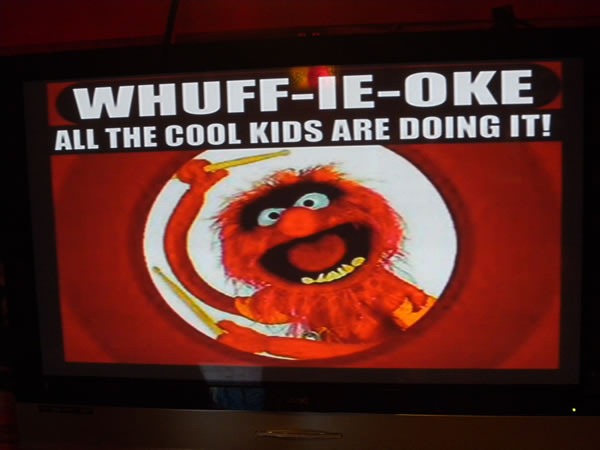
Last week, I caught up with an old karaoke buddy: Tara Hunt, honest-to-goodness social media marketer (unlike the gazillions on Twitter who merely claim to be one), popularizer of BarCamp unconferences and coworking spaces and author of The Whuffie Factor. She just completed a move from San Francisco to Montreal by van, a move during which she stopped at various cities’ karaoke bars and thus named Whuffaoke or Bust. She didn’t pass through Accordion City during the move, but dropped by last Monday to bring the Whuffaoke or Bust tour to her old home.
Her Toronto Whuffaoke drew a crowd:

The folks at the venue, Tequila Sunrise, were able to personalize the event on their displays:

She brought along some copies of The Whuffie Factor and naturally, I bought a copy. I got her to autograph it for me, and she wrote the nicest things:

“Thanks for being my inspiration to blog years ago. I would be here without you!”
A Brief Personal History of Whuffie
My first encounter with the concept of whuffie was in late 1999. Cory Doctorow was trying to get me to join his company-within-a-company to build software that would help you find things you didn’t even know you were looking for. The idea behind the software was to harness the content and searches of people whose interests were similar to yours – chances are that they’d have content and search results that would be relevant but unknown to you.
In that software, which would eventually become OpenCola, whuffie was a personalized measure of similarity. If someone had many interests similar to yours, s/he would have a lot of whuffie in your eyes. However, that same person and I might have very different interests, and s/he would have very little whuffie as far as I was concerned.
Cory would later use the concept of Whuffie in his first novel, Down and Out in the Magic Kingdom. In the novel, the “Bitchun Society” – a variant of The Technological Singularity — had been achieved. The world had entered an age of plenitude, where scarcity has been eliminated, death is obsolete and people can do or become whatever they like. In the Bitchun Society, whuffie – a score calculated based on your personal reputation, actions and contributions to society – had replaced currency.
Whuffie has a symbol similar to a dollar sign. It’s a W with two horizontal lines:

In my autographed copy of Down and Out in the Magic Kingdom, Cory signed it with “Who put the [whuffie symbol] in Whuffie?”
Whuffie has since been used as a term for the concept of social capital, and that’s how it’s used in Tara’s book. Here’s how she defines it:
Whuffie is the residual outcome – the currency – of your reputation. You lose of gain it based on positive or negative actions, your contributions to the community, and what people think of you. The measurement of your whuffie is weighted according to your interactions with communities and individuals. So for example, in my own neighborhood, where I have built a strong reputation for being helpful, my whuffie is higher than when I travel to another neighborhood where nobody knows me. There, members of that community “ping” my whuffie to find out whether I can be trusted. But for me to be fully welcomed, I can’t simply use my whuffie account; I need to be helpful there as well. And I can do that, as Cory Doctorow points out in Down and Out in the Magic Kingdom, in three ways: be nice, be networked or be notable.